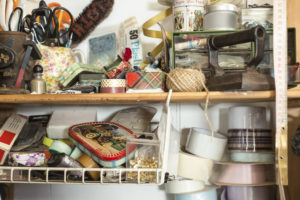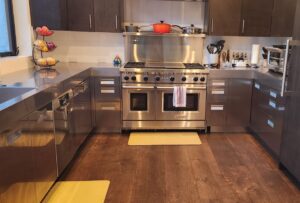If you’ve ever tried to declutter you know the process is often harder than just tossing items into the trash or donation bag. This is because our stuff can trigger different parts of our brains to act in certain ways depending upon how we typically look at our possessions.
You may for example want to tackle your garage when suddenly you are flooded with memories from that box of items containing your old school memorabilia. Or you may get stuck culling things down in your clothes closet when you come across that gown you spent a lot for 8 years ago for a one-time event.
Sometimes, we see the potential in some object and think, I can use this “someday” but of course we don’t and it goes back into the pile of undecided stuff.
When we don’t know what questions to ask ourselves to help us make decisions, it becomes like moving the dust around the floor with a broom and calling it cleaning.
Today, I’m sharing a simple way to understand the four most common reasons we keep stuff and what to do about it when it’s time to declutter. For each item, I include the common belief we have, how it shows in our behavior, examples of how it shows up and recommended solutions. See if any of them sound like you. Chances are once you know what question to ask yourself, it will be easier to decide whether it makes sense to keep it or let it go.
Sentimental
Belief: Possessions and mementos are connected to memories. If I let it go, I will forget the person, event or memory.
Behavior: Things are kept not so much for their usefulness but for what memory or connection they evoke even if the thing has no value.
Examples: Ticket stubs, cheap souvenirs, tourist maps; useless, damaged or generic items that were previously owned by a family member or close loved one.
Solution: Learn to separate things from memories and experiences. Take a photo if necessary. Curate your collection – only keep the things that you enjoy the most.
Ask yourself, “Does keeping this truly honor the memory of this person?” or,
“If it disappeared or were lost, would I really miss it?”
Useful
Belief: Everything is usable. Everything can be repurposed. Get rid of nothing. There’s a “logical” reason for keeping it. Nothing should go in the trash. It’s okay if my home becomes a landfill.
Behavior: Things are kept ignoring how cluttered the space is or how negatively the accumulation has impacted your life and well-being. You become “clutter-blind.” Everything is evaluated separately but not cumulatively.
Examples: Cardboard toilet paper rolls, dirty plastic cups, stained, torn or soiled clothing, broken or badly chipped dishes.
Solution: Just because something may be “useful” does not mean it has to be kept.
Ask yourself, “If I saw this at a thrift shop or in a store would I pay at least $1 to buy it again?” or “Have I used it in the past year and is it likely I will use it again?”
Perceived value vs. actual value
Belief: I spent money on it so I should keep it.
Behavior: Unable to let go of anything with perceived value even if facts point to the contrary. Holds onto things to quell fears of scarcity or not having enough. May be learned behavior from family of origin.
Examples: Clothing for which a lot was paid more than 5 years ago even though you’ll never wear it again. Old furniture that can’t be sold or re-sold given current market demands or interest.
Solution: Determine it’s real, market value. Learn to come to terms with fears about money and scarcity. Explore and challenge beliefs formed in early childhood that may no longer apply. Accept the changing tastes of buyers. Donate or gift to others through groups such as local Buy Nothing Group or online community. Leave on curb if possible.
Ask yourself, “What’s the easiest way I can find a new “home” for this without spending a lot of time?”
Creative Potential
Belief: Everything can be re-purposed. Sees the potential use in objects most would consider of little or no value. Or sees the “artistic” or “creative” potential in things.
Behavior: Positive: Tend to be very creative, energetic, innovative and deeply committed to art or hobbies. Negative: Often possess too much “stuff” that has never been used and no longer reflects the owner’s current ideas. Often has trouble managing time and priorities. Chronically late or unable to finish projects. Feels guilty for not meeting goals.
Examples: Old furniture (or any object) that needs refinishing or repair to be useable. Small fabric scraps. Art and craft supplies for hobbies you no longer do.
Solution: Wait until you have the project in mind then find only what you need. Take advantage of Established limits and boundaries. Donate items to non-profits in your area that accept teacher or educational supplies. If you are in the San Francisco Bay Area, you can donate to the East Bay Depot for Creative Reuse in Oakland or SCRAP in San Francisco. Donate good quality fine art supplies to 333Arts in Walnut Creek. Just be sure to check ou their donation hours first and what they will/won’t accept. Doing so will save you time and fuel.
Ask yourself, “Is this project a priority for me right now?” Or, do I have suitable storage and workspace for this?
Feeling overwhelmed by your decluttering project? Schedule a free, no obligation, discovery call with me and I promise, you’ll come away with actionable ideas you can use right away.



